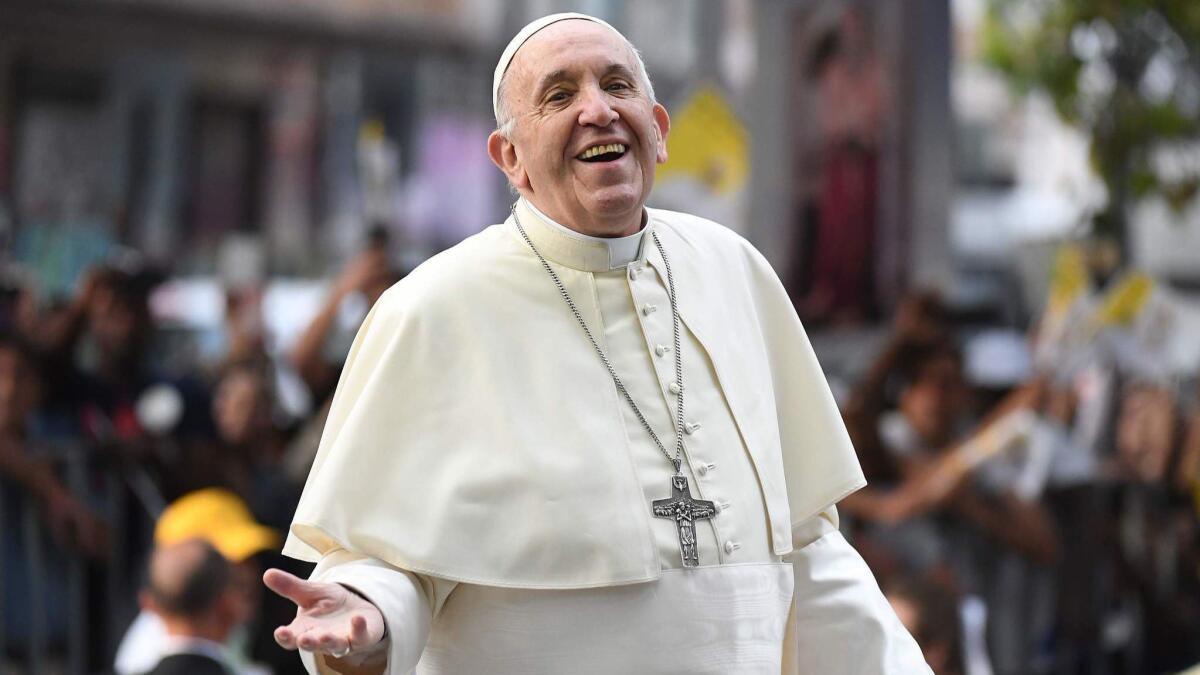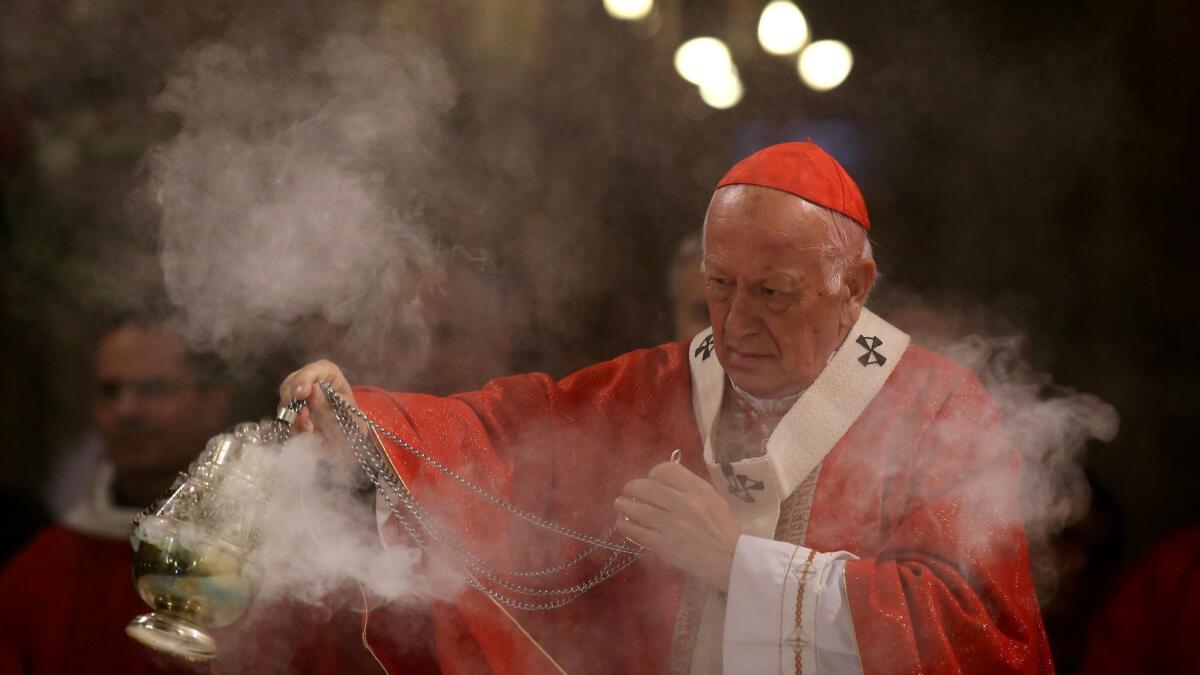Vatican at crossroads in handling clergy sexual abuse cases

Reporting from Rome — Pope Francis did an about-face last month and denounced the widespread cover-up of sexual abuse by priests in Chile, prompting all 34 of the country’s bishops to offer their resignations.
He has said he was not receiving “truthful and balanced” information from the bishops, and on Thursday he released a letter to all Chileans declaring the Roman Catholic Church would “never again” tolerate “the culture of abuse and the system of cover-up that allows it to perpetuate.”
The Vatican also announced the pope was sending a team of prelates to Chile to “advance the process of reparation and healing of abuse victims.”
But Francis has not revealed his plans for the church officials who ignored or actively covered up the abuse.
He faces competing demands. Prominent abuse victims who have become activists have demanded sweeping prosecutions under canon law, and some analysts agree that such accountability is the only way to restore public faith in the church. But one key figure in the scandal, Chilean Cardinal Francisco Javier Errazuriz, is close to the pope, and if church prosecutions stack up in Chile, Francis may find too few untainted candidates to replace the accused.
One senior Vatican official, speaking on condition of anonymity, said Francis may start replacing bishops in the next few weeks.
The first to go, according to the official, are likely to be the four bishops who trained under Fernando Karadima, the Chilean priest at the center of the scandal, and have been accused of witnessing or covering up his abuse. Karadima abused scores of boys during the 1980s and 1990s, and in 2011 he was sentenced by the Vatican to a life of penance, banning him from public ministry to repent for his sins and pray for his victims.
One Vatican expert predicted Francis would ultimately accept the resignations of almost half of the bishops.
“To the four Karadima students, we can add four others who are over 75 and due for retirement,” said Luis Badilla, a Chilean journalist who lives in Rome and edits the website Il Sismografo, which reports on the Vatican. “That’s eight and that will happen fast, while another five or six replacements will take longer.”

Robert Mickens, editor of the Catholic newspaper La Croix International, said the Vatican’s ambassador to Chile was also in danger of losing his job for allegedly keeping Francis in the dark over the extent of abuse by priests in Chile.
The big question, though, is whether those moves will be enough to placate the victims and Chileans whose faith in the church has been shaken.
“Resignations are a good step, but that is the minimum,” said Juan Carlos Cruz, who was abused by Karadima in the 1980s and who over the last decade has emerged as a key advocate for justice. “If there is a case to respond to in canon law, I expect punishments.”
He and other activists said those punishments must also extend to Errazuriz, who was the top bishop in Chile from 1998 to 2010 and ignored reports of abuse by Karadima until the victims went public. He has been accused of actively covering up for Karadima and working to discredit the priest’s accusers.
“He is as evil as you can get, and I would like to see him punished,” said Cruz, 51, who now lives in Philadelphia and works as a brand manager for a multinational company.
In emails to Chilean Cardinal Ricardo Ezzati in 2013 and 2014, which were leaked to the Chilean press, Errazuriz refers to Cruz as a “serpent.” The emails seem to show the cardinal blocking a 2014 effort to get Cruz appointed to a papal commission on clergy abuse worldwide.
Marie Collins, an Irish abuse victim and advocate who served on the commission, also called on the pope to investigate and prosecute Errazuriz for his alleged role in the cover-up.
“You can see from the emails he has no compunction in working behind the scenes at the Vatican to silence a victim,” she said.
But prosecuting Errazuriz may prove too much for Francis, whose friendship with him dates to a 2007 conference of Latin American bishops held in Brazil. Since the start of Francis’ papacy in 2013, Errazuriz has been his right-hand man on the so-called C9 committee for Vatican reform, which the pontiff established to shake up the Vatican’s opaque bureaucracy.
Badilla said he expected Errazuriz would be eased off the committee when Francis next reshuffles members, though the pope may be less likely to single out such a high official for blame.
Still, the pontiff’s actions last month are part of a dramatic U-turn.
Francis is widely seen as a reformer working to bring the church in line with modern society, but he has long been criticized for paying lip service to combating abuse without truly understanding its pervasiveness.
In a visit to Chile in January, he accused Karadima’s victims of peddling “slander” and publicly supported Juan Barros, a Chilean bishop who faces accusations that he witnessed abuse by Karadima and did nothing to stop it.
A month later, Francis sent an investigator to talk to those victims.
In Cruz’s view, the pope realized the church was in danger of losing more followers if he failed to act.
The first indication of that came when fewer people than expected turned out for his visit to Chile. Another wake-up call came later that month when U.S. Cardinal Sean O’Malley said Francis’ “slander” accusation had created “great pain” for the victims.
After the 2,300-page investigative report was completed — its conclusions have not been made public — Francis invited Cruz and two other Karadima victims to meet with him at the Vatican.
Cruz said that he told Francis: “You could be the most amazing pope in the world if you stop this.”
“I think he was listening,” Cruz said.
Two weeks after the meeting, the pope met with Chile’s bishops and accused them of destroying evidence of abuse and putting church investigators under pressure to play down accusations.
Not only did that spur the bishops to offer their resignations, it also prompted calls for the Vatican to revive plans to create a tribunal within the church to punish bishops for covering up abuse.
The pope dropped the plan in 2016, promising instead to beef up existing procedures for sanctioning bishops. Critics accused the pope of bowing to pressure from other Vatican officials.
In an editorial last month, the National Catholic Reporter wrote: “The shock of these mass resignations creates an opportunity and momentum that Francis should seize upon to implement the tribunal he proposed three years ago. No more delays. He should act now.”
Collins, who was serving on the papal commission investigating abuse, resigned in protest whenthe tribunal plans were scrapped.
She remained skeptical that the pope would act aggressively.
“If he won’t use that procedure to handle bishops in Chile, I doubt it will ever be used,” she said.
Collins pointed to Australian Archbishop Philip Wilson, who was found guilty in a civil court last month of covering up child sex abuse in the 1970s by a priest in New South Wales.
“Wilson has now been convicted but has yet to be sanctioned by the church,” she said.
Kington is a special correspondent.
More to Read
Sign up for Essential California
The most important California stories and recommendations in your inbox every morning.
You may occasionally receive promotional content from the Los Angeles Times.










